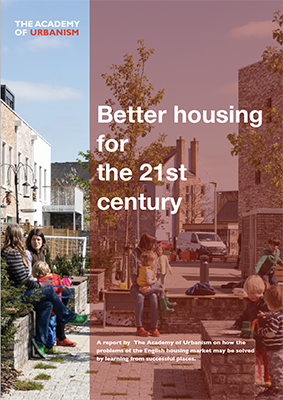Improve new housing by changing land tax, reintroducing development corporations, and unleashing a wave of smaller builders, report from The Academy of Urbanism says
Promoted by the renewed interest in housing policy, the report – ‘Better housing for the 21st century’ – draws on places that have been shortlisted for Academy of Urbanism Awards both in the UK and other parts of Europe to draw some lessons for policymakers. A combination of new ideas and the reintroduction of some forgotten approaches can, the authors suggest, solve the UK housing crisis and create better neighbourhoods.
Changes proposed include the widespread use of development corporations which were used by the post-war government. In the last few years we have seen new Mayoral development corporations in London and most recently in Manchester, with planning and land assembly powers. But they have a wider role in large scale housing schemes such as garden cities.
The report also recommends changes to land taxation and regulation to allow the new development corporations to buy land at its current value, rather than its value once planning permission is granted. This the authors say would generate the funding for vital infrastructure such as public transport as well as many more sites for self-build.
David Rudlin, chair of the Academy of Urbanism, said: “There are a raft of measures and some more radical steps which the government can take to open up our housing market. Successive governments have put off dealing with some difficult decisions.”
The government also needs to prise open the grip of the UK’s big housebuilders by backing access to finance for small builders. These ‘volume builders’ deliver the majority of new housing, but three-quarters of which has been labelled ‘mediocre or worse’ by a recent audit by University College London.
“By backing access to finance for small builders, standards and choice for the consumer will grow. Investment should also be pledged towards new technologies which can utilise off-site building techniques. There is a much greater role for custom-build in which buyers would be able to specify housing as they do a new car,” Rudlin said.
The Academy outlined the following changes it would like to see made:
1. Reform strategic planning by building in the right place on land assembled at the right price, supported by social and physical infrastructure.
2. Raise the standard of design by committing to levels of the highest quality, to learn from what works and drive to improve skills across the industry
3. Open up the markets to drive innovation by competition, collaboration and diversity
4. Fund the development of affordable housing to secure the wellbeing of individuals that are considered vulnerable economically or socially and bring in new policies to make renting and owning a house more attainable for all.
5. Establish an independent commission to look at the planning system to unlock its potential through radical action.
The report can be found here.
For more information: please contact Stephen Gallagher on sg@academyofurbanism.org.uk or 00 44 (0)7840 436 844.
About the Academy
The Academy of Urbanism is a politically independent, not-for-profit organisation that brings together both the current and next generation of urban leaders, thinkers and practitioners. The Academy promotes research and knowledge sharing on what makes good cities, towns, neighbourhoods, streets and places. It also works with places to identify and reinforce their strengths.
Report authors: Jon Rowland (Report Chair), Steven Bee, Esther Caplin, Dr Nicholas Falk, Stephen Gallagher, David Rudlin, Janet Sutherland, Stuart Turner.

